Phil Santoro and David Kolodny met while working together at Google and co-founded Wilbur Labs, a San Francisco-based startup studio, in 2016. Turning bold ideas into industry-leading companies, Wilbur Labs aims to identify big customer pain points and build businesses to solve these problems. With Wilbur Labs, they have built and invested in 15 technology companies, including VacationRenter, Vitabox, Joblist, and Barkbus. Phil is also a co-founder at Private Pilot and a Guinness World Record holding competitive eater. David was named to the 2020 Forbes 30 Under 30 list for Consumer Technology.
What does “entrepreneurship” mean to you?
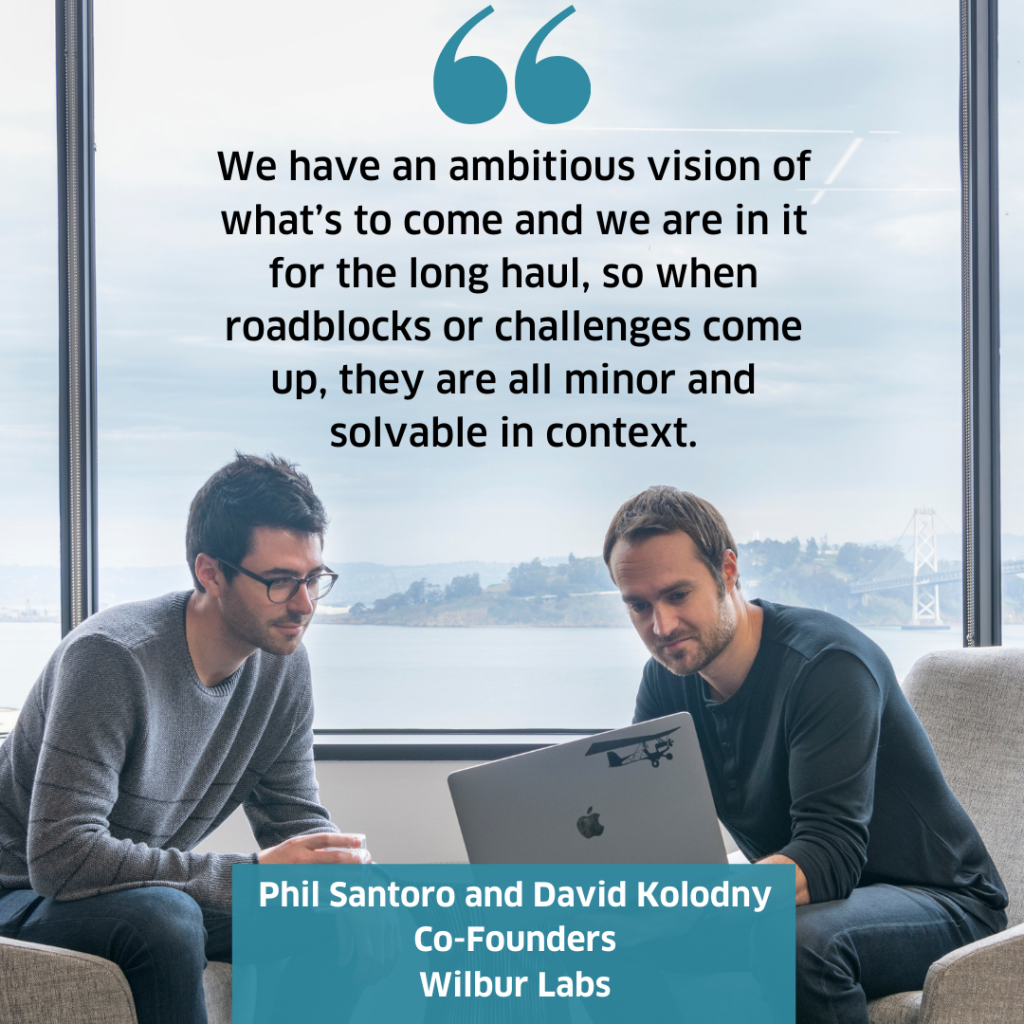 Phil Santoro: Entrepreneurship is about having a vision for what could be made better, plus the willingness to work incredibly hard and take on big risks to achieve it. Entrepreneurs are the foundation for modern economies — building startups and small businesses that tackle important problems, and innovating to pave the way for our future.
Phil Santoro: Entrepreneurship is about having a vision for what could be made better, plus the willingness to work incredibly hard and take on big risks to achieve it. Entrepreneurs are the foundation for modern economies — building startups and small businesses that tackle important problems, and innovating to pave the way for our future.
How did your company come to be?
PS: After college I went to work at Google, where I met David [Kolodny]. We both started on the same team, on the same day, back in 2013. We moved teams multiple times and sat next to each other for over two years. We realized early on that both of us wanted to start a company, since I had started a company before Google, and David had been working on several startups. David and I had a recurring dinner every week where we would grab food at the same restaurant and brainstorm startup ideas. We ultimately realized that we wanted to solve problems across multiple industries and decided to launch the startup studio: Wilbur Labs. Over the last few years, we have continued to identify large pain points and build businesses to solve these problems. Since 2016 we have built and invested in 15 companies, including VacationRenter, Joblist, Vitabox, and Barkbus.
How has your business changed in response to the COVID-19 pandemic?
David Kolodny: 2020 has been an unpredictable, challenging time for every business, and for every entrepreneur. We’ve made countless changes in response to the pandemic, but one key adjustment to highlight is how we paired real-time data with automation wherever we could.
Ordinarily, businesses rely heavily on historicals, such as year-over-year metrics. In the course of a global pandemic, historical data is largely worthless because whatever happened last month is not necessarily an indicator for what is happening today or tomorrow. Since the beginning of the pandemic, we’ve worked with each Wilbur Labs portfolio company to build dashboards focused on real-time metrics to ensure that decisions are being made on the most relevant data possible.
Similarly, in normal times, companies can lean on manual processes to drive growth. That’s because customer trends can often be somewhat predictable. During the pandemic, we’ve seen global ecommerce adoption sustain five years of growth in five weeks. With such rapid change, it is impossible for manual processes to keep up. By utilizing automation wherever applicable — and connecting it to the real-time data described above — we have been able to ensure that our portfolio companies are maximizing every opportunity available to them.
What is your proudest and darkest moment so far?
PS: Our darkest moment was last January and February, leading up to the pandemic. Due to our exposure to international travel, we had early warnings, before the pandemic had reached the United States. We had seen international travel demand drop by 50% overnight and knew there was a tidal wave headed our way. We started bracing for impact and going company by company to help support them and their leadership teams. This was a very difficult time for a lot of companies, but it was uniquely difficult for us because we have a portfolio of so many different businesses. Each industry and company was affected in its own way.
Our proudest moment was when one of our portfolio companies, VacationRenter, recently announced generating over $1 billion in gross booking value for 2020 – making it the fastest growing travel company ever. They were also named one of the 100 fastest-growing websites of 2020 by SimilarWeb. This is an incredible achievement for any company, however, achieving this as a travel company during a pandemic is extra impressive. This is a testament to the team solving a very important problem for customers, and all the hard work everyone put in the last year to adapt and evolve ahead of the industry.
How is your company changing the landscape?
DK: We’re changing how to build and scale companies.
When we launched Wilbur Labs in 2016, there was no standard approach to building a startup studio, and the business model was still unproven. We set out to rethink how companies should be built and in looking at any data points regarding startup failure, it was clear that capital alone is not what builds successful businesses.
Fast forward to today, we have built and invested in 15 companies. We launch several new companies every year. Since the beginning, we have accumulated countless processes, learnings, and playbooks in every area of business building. This organizational knowledge, or what we call studio knowledge, continues to compound over time. The result is that we are changing how quickly startups can launch and how rapidly they can scale.
What do you wish you knew when you started? Is there anything you would do differently?
PS: I wish we took less generic advice early on. We made some mistakes early by taking advice or going down a route that was typical for other companies, but in hindsight didn’t make sense for the studio model. I think sometimes people avoid reinventing the wheel because they think it will always be a waste of time. But, reinventing the wheel is a totally acceptable activity if your goal is to build a better wheel. Getting a lot of smart people in a room to think through a problem is much better than asking others how a problem is typically solved. Both methods involve getting help from others, but the latter method is better suited when you are doing something that hasn’t been done before.
What advice/credo do you live by as you grow the business / what is your professional and personal mission statement?
DK: The best advice to grow any business is to solve a real problem. If you aren’t solving a clear customer pain point, it will be impossible to scale a business successfully.
Where do you find inspiration when faced with challenges?
DK: If you are passionate about the long-term vision you are building, finding inspiration when challenges arise happens organically. When Phil and I talk about Wilbur Labs, we don’t talk about a five-year plan – we talk about a fifty-year plan. We have an ambitious vision of what’s to come and we are in it for the long haul, so when roadblocks or challenges come up, they are all minor and solvable in context.
For the same reason, we ask every founder we work with if they’re ready to be solving one specific problem for 5+ years. If the answer is no, we know that it will be hard to find inspiration when challenges come up, and hard to build a lasting business.
What does “success” look like for you? What do you think will help you achieve it?
DK: At Wilbur Labs our focus is solving big problems – we turn bold ideas into market-leading companies. Success for us is when we identify large consumer pain points, then build businesses to solve these problems.
Has personal or professional “success” changed for you since the COVID-19 pandemic?
PS: During the pandemic, we quickly went into protection mode and focused on protection of people and our portfolio of companies. We realized early on that outside of our employees, there were a lot of people that would be in pain and impacted beyond what we could imagine. We came together quickly as a team and made a large donation to two local food banks in Oakland and San Francisco. Through one of our companies, Vitabox, we were also able to donate over 1,100+ bottles of hand sanitizer and Clorox wipes to local hospitals and food banks. That was toward the end of March, in the thick of it when everything we knew was crashing down personally and professionally. To be able to use what we have built to have a small, positive impact around us was very motivating and brought the team together.
DK: On the professional side, quantitatively speaking, COVID-19 changed how we measure success overnight. Previously, it was easier to set goals because things were more predictable. COVID-19 caused all historical trends to change overnight and with that, all former quantitative “measures of success” changed as well. We quickly mobilized to either deal directly with COVID-19 impact or to focus on critical priorities to keep growing (in hopes to offset some of the damage). Phil and I cleared our calendars for a long period and scheduled meetings seven days a week with some company leads to help get through this. It was all hands-on deck and every team stepped up to the plate. We established new roadmaps, and new goals, based on the most recent data we had every step of the way. Today, each of our companies is in a stronger position than before the pandemic, and we have a very positive outlook on creating new companies during this time.
What’s it like to work alone or with your partners? What advice do you have for fellow entrepreneurs about building and leading teams?
PS: The biggest piece of advice I give others looking for a co-founder is to create a strong working history before you launch a company. Founder conflicts kill a very large number of startups every year. The best co-founders are people you know you work well with – because you have worked well before. By having a strong working history, you will be able to gauge working style, values, goals, and other attributes that lead to a successful partnership. While it’s important to have complementary skills, it’s also critical you think alike where it matters and have a large amount of trust in each other. Having a strong working history also reduces risk significantly, since you already know upfront how you will work together.
Starting a company is a very long journey – many businesses require 5+ years to get started and 10+ years to create significant value. It’s critical to find someone who you will work well with over the long term, not just someone who has skills you don’t have today. This goes for building a wider team as well, because people are by far the most important part of any company. Even at a tech company, its employees who are talking with customers, designing, and building your product.
Many entrepreneurs continue to perfect their daily routines to support their work and greater vision; would you mind sharing your morning routine or a regular ritual that grounds your work each day? How has it changed in recent months?
PS: Sometimes in order to move quickly you need to slow down and plan. One of my morning rituals is a 15-minute block for morning checks and planning. First thing in the morning, I follow a preset checklist for different reports I need to review from the prior day. I finish up by examining my schedule and plan for the day, including adding in any items which came in overnight. Taking just a few minutes to review items and plan ensures that each and every day starts off organized and productive.
In recent months, my biggest change has been to schedule more unstructured time blocks throughout the day. We have a large portfolio of companies, and half my time is spent supporting them and any emergencies that come up. Before I started scheduling unstructured time, I would have back-to-back meetings all day and when emergencies would arise, I would have to clear out my entire calendar for the day. Scheduling free time or working blocks prevents that from happening.
What keeps you motivated during this time?
PS: I find that focusing long-term keeps me motivated and focused on solving the problems that matter. Entrepreneurs continually face short-term emergencies and stressors that can become overwhelming, especially during this past year we’ve had. I remind myself not to worry about things that aren’t impactful over the long-term. I make sure to ask myself, “Will this matter six months from now?” The answer is usually “no.” It’s also imperative to enjoy the journey and not try to rush to some destination. Don’t stress about an upcoming exit or milestone. It’s a long journey, and embracing that journey will let you stay motivated for longer.
What kind of an entrepreneur do you want to be known as, as in, what do you want your legacy to be?
PS: We talk a lot about how we are still at the beginning, even though our portfolio companies have already helped hundreds of millions of people travel the world, find a job, discover the right insurance plan, order everyday essentials, and care for their pets. David and I are building Wilbur Labs for the next 50 years, not just the next few years.
What is a quote or some words of wisdom that help get you through the tough days?
DK: One of our values at Wilbur Labs is inspired by George S. Patton’s quote where he says, “A good plan violently executed now is better than a perfect plan executed next week.” Planning is critical, but is not a substitute for action. On tough days, this wisdom can go a long way – it is better to move forward and continue making progress than it is to wait for the perfect plan.
Have you experienced mentorship in your career? Do you feel it was easily available to you?
PS: We operate across several industries, so advisors are a key part of our model. David and I are experts in building companies: validating an idea and scaling up a company, but we aren’t experts in every industry. We rely on several advisors and mentors who do have expertise in areas we don’t. It’s easy for us to find others who have skills and insight we lack since we make this a priority.
Who are the people who have mentored or influenced you in your life or career? How has their influence changed the trajectory of your entrepreneurial journey?
DK: As Phil mentioned, advisors are a key part of our model and we have many mentors. One person in particular that we’d like to highlight is Chris Fong, who has been a key mentor to us both. Chris worked at Google with Phil and I, left shortly before us, and started the Xoogler.co community. The community is comprised of more than 7,000 current and ex-Google employees working together to help each other in the startup ecosystem. Chris, and the Xoogler.co network, have helped us build the Wilbur Labs community, recruit key hires, as well as make strategic decisions. Chris has also helped us connect with several other ex-Google employees who have now become advisors.
Do you have someone you’d like to nominate to be profiled in our Faces of Entrepreneurship series? Please let us know by emailing media@thecenter.nasdaq.org.
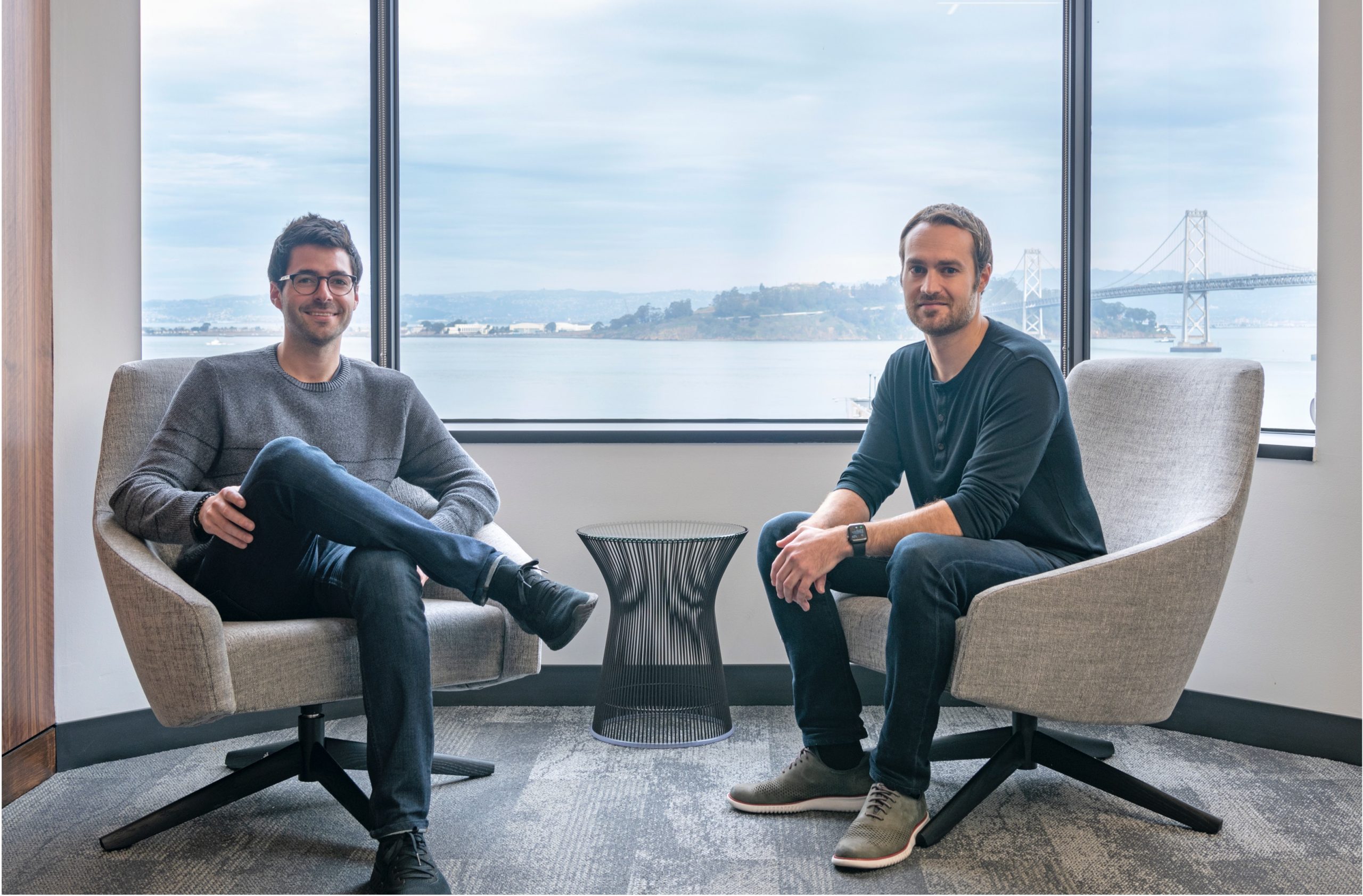
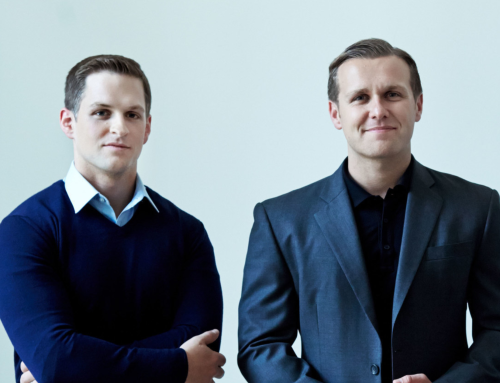
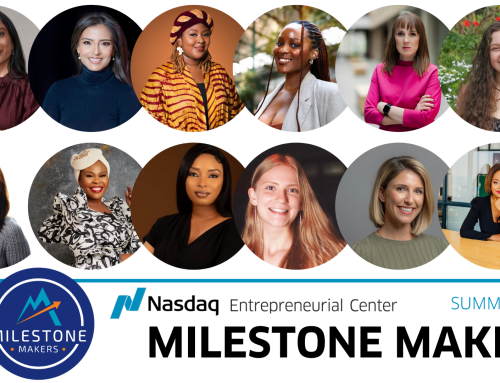
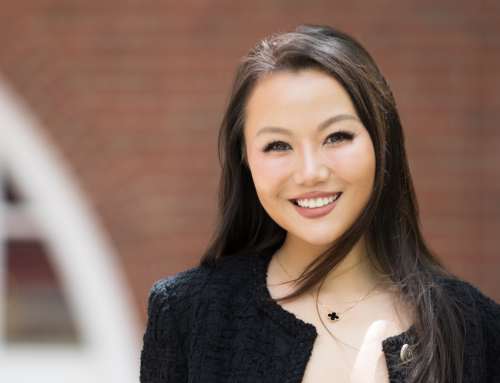
Invite a Friend
Close